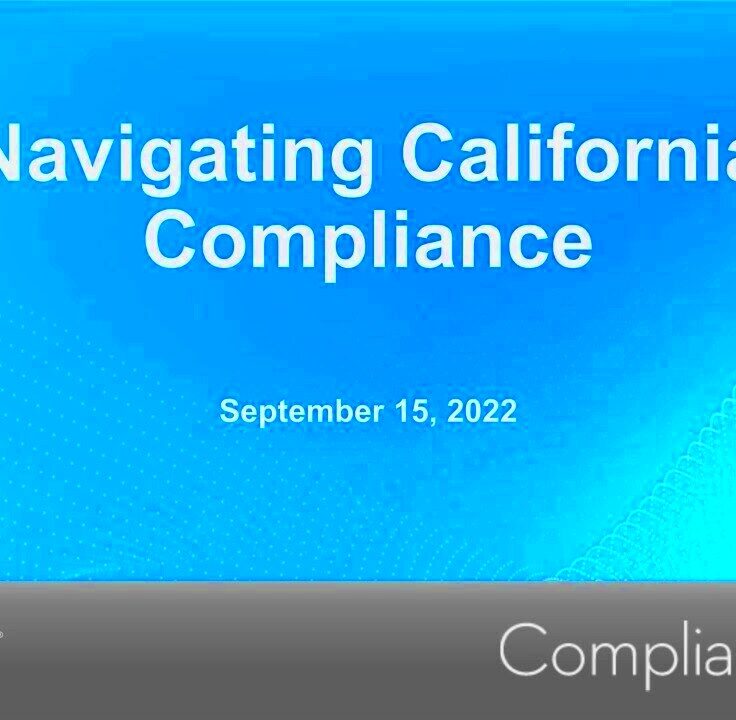California’s Business Regulation Compliance Overview
California is known for its diverse economy and vibrant business environment. However, this comes with a complex web of regulations that businesses must follow. Compliance with these regulations is crucial for any business operating in the state. It ensures that companies not only avoid legal issues but also contribute positively to the community and economy. Understanding these regulations can be overwhelming, but it’s essential for long-term success in California’s competitive market.
Importance of Compliance for Businesses

Compliance with business regulations is not just about avoiding penalties; it’s about building trust and integrity in your business operations. Here are some reasons why compliance matters:
- Legal Protection: Following regulations helps protect your business from lawsuits and fines.
- Reputation Management: A compliant business enhances its reputation, attracting customers and investors.
- Operational Efficiency: Compliance often leads to streamlined processes and improved efficiency.
- Market Competitiveness: Businesses that comply with regulations are often more competitive in their industry.
- Employee Satisfaction: A compliant workplace is safer and more respectful, leading to higher employee morale.
In essence, compliance helps businesses thrive while contributing to a fair marketplace.
Key Regulations Governing California Businesses

California has several key regulations that businesses must be aware of. Here’s a breakdown of the most significant ones:
| Regulation | Description |
|---|---|
| California Labor Code | Sets standards for employee rights, including wages, working hours, and workplace safety. |
| California Environmental Quality Act (CEQA) | Requires businesses to assess environmental impacts before undertaking projects. |
| Consumer Privacy Act (CCPA) | Gives consumers more control over their personal information and requires businesses to protect it. |
| Occupational Safety and Health Administration (OSHA) | Establishes workplace safety standards to protect employees from hazardous conditions. |
| Fair Employment and Housing Act (FEHA) | Prohibits employment discrimination and promotes equal opportunity in the workplace. |
These regulations play a vital role in shaping a fair and equitable business environment in California. Understanding and adhering to these laws is essential for the success and sustainability of any business.
Steps to Ensure Compliance with State Regulations
Ensuring compliance with state regulations may seem daunting, but breaking it down into manageable steps can make it much easier. Here’s a straightforward approach to keep your business on the right track:
- Understand the Regulations: Start by familiarizing yourself with the specific laws and regulations that apply to your industry. This includes labor laws, environmental regulations, and tax obligations.
- Conduct Regular Audits: Regular audits help identify any areas where your business may be falling short. This can include reviewing financial records, safety protocols, and employee practices.
- Implement Training Programs: Educate your employees on compliance matters. Regular training ensures everyone understands their responsibilities and the importance of following regulations.
- Create a Compliance Checklist: A checklist can help streamline the compliance process. Include all relevant regulations and review them periodically to ensure adherence.
- Seek Professional Guidance: If you find certain regulations too complex, don’t hesitate to consult with a legal expert or compliance consultant. They can provide valuable insights tailored to your business.
- Stay Informed: Regulations change frequently. Keep up with any updates or changes in laws that may affect your business operations.
By following these steps, you can build a strong compliance culture within your business and avoid potential pitfalls.
Common Compliance Challenges Faced by Businesses
Even the most diligent businesses can encounter compliance challenges. Understanding these common hurdles can help you prepare and navigate them effectively:
- Complexity of Regulations: With numerous regulations to follow, it can be overwhelming to ensure that every aspect of your business is compliant.
- Resource Limitations: Smaller businesses may lack the resources to dedicate to compliance efforts, making it difficult to keep up with requirements.
- Employee Training: Ensuring all employees are adequately trained on compliance issues can be a challenge, especially in larger organizations.
- Keeping Up with Changes: Regulations often change, and staying updated can be a full-time job in itself.
- Documentation and Record-Keeping: Maintaining proper records to demonstrate compliance can be cumbersome and time-consuming.
Recognizing these challenges is the first step toward finding solutions. With the right strategies in place, businesses can effectively manage compliance.
Resources for Business Regulation Compliance in California
There are several valuable resources available to help California businesses navigate the complex landscape of regulations:
- California Department of Justice: Offers guidance on various laws and regulations, including labor and employment laws.
- California Chamber of Commerce: Provides resources and training programs aimed at helping businesses understand compliance requirements.
- Small Business Administration (SBA): Offers a wealth of information on compliance, including access to workshops and webinars.
- Local Business Associations: Many local chambers of commerce and business associations provide resources tailored to specific industries.
- Online Compliance Tools: There are several software solutions available that can help automate compliance tracking and reporting.
Utilizing these resources can greatly simplify the compliance process, allowing businesses to focus on what they do best—growing and serving their customers.
Consequences of Non-Compliance
Non-compliance with California business regulations can have serious repercussions. Understanding these consequences is crucial for any business looking to thrive in this environment. Here are some potential outcomes of failing to comply:
- Legal Penalties: Businesses may face hefty fines and legal action from state or federal agencies. These penalties can escalate quickly, affecting your bottom line.
- Loss of Licenses: Non-compliance can result in the suspension or revocation of business licenses, making it impossible to operate legally.
- Reputational Damage: A non-compliance incident can tarnish your business’s reputation. Customers and clients may lose trust, leading to a decline in sales.
- Operational Disruptions: Compliance issues can lead to investigations that disrupt your daily operations, affecting productivity and profitability.
- Employee Turnover: Non-compliance can create a toxic work environment, leading to low employee morale and higher turnover rates.
To avoid these severe consequences, businesses must prioritize compliance and take proactive measures to stay within the law.
Frequently Asked Questions
Many business owners have questions about compliance and how it affects their operations. Here are some common FAQs:
- What is compliance? Compliance refers to adhering to laws, regulations, and internal policies that govern business operations.
- How can I determine which regulations apply to my business? Research your industry and consult with legal experts to identify relevant regulations.
- What should I do if I discover non-compliance? Address the issue immediately, seek legal advice if necessary, and implement corrective measures.
- Are there penalties for unintentional non-compliance? Yes, even unintentional violations can lead to penalties, though some agencies may show leniency for first-time offenses.
- Where can I find resources for compliance assistance? Resources are available through state agencies, local chambers of commerce, and industry associations.
Conclusion on Compliance Importance for California Businesses
In conclusion, compliance with state regulations is vital for the success of businesses in California. It goes beyond mere legal obligation; it builds trust with customers, fosters a positive workplace environment, and enhances your business’s reputation. By prioritizing compliance, you not only avoid penalties but also position your business for sustainable growth. With the right knowledge and resources, you can navigate California’s regulatory landscape confidently. Remember, staying informed and proactive is the key to thriving in this ever-evolving business environment.


